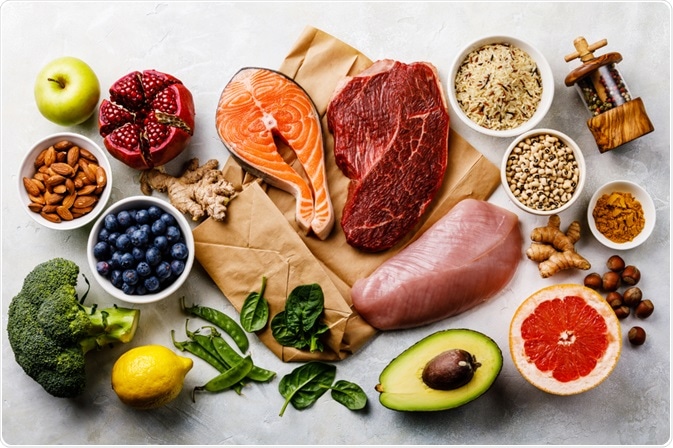Cancer is multifactoral disease caused by genes and exposure to environmental toxics. Whilst certain risk factors are unmodifiable (such as the genes that a person has inherited), other risk factors, such as lifestyle and environment, can be altered to help prevent or reduce the risk of cancer.
 Lisovskaya Natalia | Shutterstock
Lisovskaya Natalia | Shutterstock
Eating a healthy and balanced diet
There is a lot of research on what raises cancer risk and what reduces it, however, no single food or supplement can prevent cancer from developing. Overall, research shows a link between eating certain groups of foods and a reduction in cancer risk.
Healthy diet includes plenty of fruit and vegetables (at least 5 portions a day), plenty of bread, rice, potatoes, pasta and other foods with carbohydrates and especially those with fiber.
Eating enough fiber reduces the risk of bowel cancer. Fibre-rich foods include wholegrain pasta, bread, breakfast cereals and rice. Pulses, fruit and vegetables are also good sources of fibre.
There should be some meat, fish, eggs, beans and other non-dairy sources of protein as well as some milk and dairy foods in diet. Although meat is good source of protein, vitamins and minerals, such as iron and zinc, there is evidence that too much of red processed meat can be bad as it may raise risk of bowel cancer. Red meat includes beef, pork and lamb and processed meat includes bacon, sausages, salami and ham. Diet should contain only small amounts of foods and drinks high in fat or sugars.
Diet should be high in foods with antioxidants. However, some of these in high amounts may raise the risk of cancers. For example, Beta-carotene, often found in antioxidant supplements, has been found to increase the risk of lung cancer developing in smokers and people who have been heavily exposed to asbestos at work.
Maintaining a healthy and normal body weight
High body weight, obesity and being overweight raises the risk of several cancers including bowel cancer, pancreas cancer, esophagus cancer, kidney cancer and breast cancer.
Quitting smoking
90% of lung cancer cases are related to smoking. It is the single most important preventable factor in prevention of lung cancer. The earlier smoking is stopped the better it is.
Consuming less alcohol
Excessive alcohol consumption is linked to oral cancer, cancer of the voice box (larynx) or pharynx (back of the mouth), bowel cancer (especially in men), liver cancer and breast cancer (in women). Women shouldn't regularly drink more than 2-3 units of alcohol a day, and men shouldn't regularly drink more than 3-4 units a day.
Reducing time spent in direct sunlig
Skin cancers are common among Caucasians who are exposed to the sun’s ultraviolet rays for long durations of time. Some measures include spending time in shade between 11am and 3pm, using sun screen lotions with sun protection factor (SPF) of at least 15, covering up exposed parts of the body with cloths, hats and sunglasses.
All are advised to keep a watch on any moles or freckles that they have. Any changes in these need to be investigated. This could be signs such as the mole getting bigger or begin bleeding etc.
Practicing safe sex
Practicing safe sex can prevent transmission of sexually transmitted diseases such as Hepatitis C and Human Papilloma Virus (HPV), which have been linked to liver and cervical cancers, respectively.
Prevention of exposure to environmental factors
Work place safety among those who work with radiation and with asbestos is important. Exposure to radiation and chemicals like benzene may cause leukemias while exposure to asbestos fibers may lead to lung cancers like mesothelioma.
Vaccines for cancer prevention
Vaccines against HPV and Hepatits B are available. These can protect against cervical cancer (against HPV – Gardasil and Cervarix) and liver cancers.
Attending regular screening events
Cancer screening is an attempt to detect unsuspected cancers in an asymptomatic population. These are applied to healthy individuals usually after a certain age. Screening for cancer can lead to earlier diagnosis in specific cases. Early diagnosis may lead to extended life.
Best examples of benefits due to screening include screening for breast cancer by mammograms, for colon cancers through fecal occult blood testing and colonoscopy and for cervical cancers through regular Pap smears for cervical cytology.
Genetic testing
Genetic testing for high-risk individuals is already available for certain cancer-related genetic mutations. Some cancers are typified by certain genetic features. This includes examples like BRCA1 and BRCA2 genes for breast ovarian and pancreatic cancers MLH1, MSH2, MSH6, PMS1, PMS2 for colon, uterus, small bowel, stomach and urinary tract cancers.
Further Reading
Last Updated: Jul 11, 2023